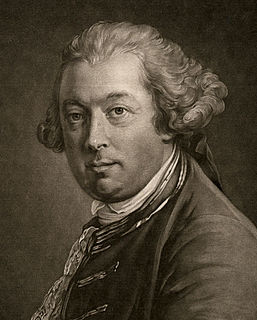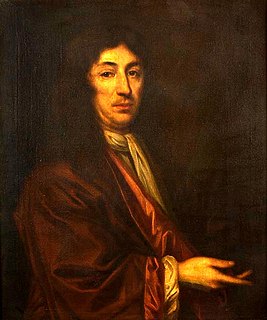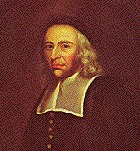
The Governor of Massachusetts is the head of the executive branch of the Government of Massachusetts and serves as commander-in-chief of the Commonwealth's military forces. The current governor is Charlie Baker.

Thomas Pownall was a British colonial official and politician. He was governor of the Province of Massachusetts Bay from 1757 to 1760, and afterwards sat in the House of Commons from 1767 to 1780. He travelled widely in the North American colonies prior to the American Revolutionary War, opposed Parliamentary attempts to tax the colonies, and was a minority advocate of colonial positions until the Revolution.

The Connecticut Colony or Colony of Connecticut, originally known as the Connecticut River Colony or simply the River Colony, was an English colony in North America that became the state of Connecticut. It was organized on March 3, 1636 as a settlement for a Puritan congregation, and the English permanently gained control of the region in 1637 after struggles with the Dutch. The colony was later the scene of a bloody war between the colonists and Pequot Indians known as the Pequot War. Connecticut Colony played a significant role in the establishment of self-government in the New World with its refusal to surrender local authority to the Dominion of New England, an event known as the Charter Oak incident which occurred at Jeremy Adams' inn and tavern.

Joseph Dudley was an English colonial administrator, a native of Roxbury, Massachusetts, and the son of one of its founders. He had a leading role in the administration of the Dominion of New England (1686–1689), which was overthrown in the 1689 Boston revolt. He served briefly on the council of the Province of New York where he oversaw the trial which convicted Jacob Leisler, the ringleader of Leisler's Rebellion. He then spent eight years in England in the 1690s as Lieutenant-Governor of the Isle of Wight, including one year as a Member of Parliament for Newtown. In 1702, he returned to New England after being appointed governor of the Province of Massachusetts Bay and Province of New Hampshire, posts that he held until 1715.

Thomas Cushing III was an American lawyer, merchant, and statesman from Boston, Massachusetts. Active in Boston politics, he represented the city in the provincial assembly from 1761 to its dissolution in 1774, serving as the lower house's speaker for most of those years. Because of his role as speaker, his signature was affixed to many documents protesting British policies, leading officials in London to consider him a dangerous radical. He engaged in extended communications with Benjamin Franklin who at times lobbied on behalf of the legislature's interests in London, seeking ways to reduce the rising tensions of the American Revolution.

John Leverett was an early American lawyer, politician, educator, and President of Harvard College.
Thomas Danforth was a politician, magistrate, and landowner in the Massachusetts Bay Colony. A conservative Puritan, he served for many years as one of the colony's councilors and magistrates, generally leading opposition to attempts by the English kings to assert control over the colony. He accumulated land in the central part of the colony that eventually became a portion of Framingham, Massachusetts. His government roles included administration of territory in present-day Maine that was purchased by the colony.

Andrew Oliver was a merchant and public official in the Province of Massachusetts Bay. Born into a wealthy and politically powerful merchant family, he is best known as the Massachusetts official responsible for implementing the provisions of the Stamp Act, for which he was hanged in effigy. He never actually carried out those duties, and was later commissioned as the province's lieutenant governor.

Moses Gill was a Massachusetts politician who briefly served as the state's Acting Governor. He is the state's only acting governor to die in office. A successful businessman, he became one of the leading settlers of Princeton, Massachusetts, entering politics shortly before the American Revolutionary War. He served on the Massachusetts Provincial Congress's executive committee until the state adopted its constitution in 1780, after which he continued to serve on the state's Governor's Council.

William Tailer was a military officer and politician in the Province of Massachusetts Bay. Born into the wealthy and influential Stoughton family, he twice married into other politically powerful families. He served as lieutenant governor of the province from 1711 until 1716, and again in the early 1730s. During each of these times he was briefly acting governor. He was a political opponent of Governor Joseph Dudley, and was a supporter of a land bank proposal intended to address the province's currency problems. During his first tenure as acting governor he authorized the erection of Boston Light, the earliest lighthouse in what is now the United States.
Spencer Phips was a British politician in the Province of Massachusetts Bay. Born Spencer Bennett, he was adopted by Massachusetts Governor Sir William Phips, his uncle by marriage, whose name he legally took. Phips served for many years in the provincial assembly, and on the governor's council, before receiving an appointment as lieutenant governor in 1732, a post he held until his death. He was twice formally acting governor.
Thomas Hinckley was the last governor of the Plymouth Colony. Born in England, he came to North America as a teenager, and was a leading settler of what is now Barnstable, Massachusetts. He served in a variety of political and military offices before becoming governor of the colony in 1680, a post he held until the colony was folded into the Province of Massachusetts Bay in 1692. A monument, created in 1829 at the Lothrop Hill cemetery in Barnstable, attests to his "piety, usefulness and agency in the public transactions of his time."
Andrew Belcher (1706–1771) was an American merchant who served on the Governor's Council of the Province of Massachusetts Bay from 1765 to 1767. Andrew married Elizabeth Teale and lived in Milton, Massachusetts. His father, Jonathan Belcher was a colonial governor of Massachusetts, New Hampshire and New Jersey.

The Hutchinson Letters Affair was an incident that increased tensions between the colonists of the Province of Massachusetts Bay and the British government prior to the American Revolution. In June 1773 letters written several years earlier by Thomas Hutchinson and Andrew Oliver, governor and lieutenant governor of the province at the time of their publication, were published in a Boston newspaper. The content of the letters was propagandistically claimed by Massachusetts radical politicians to call for the abridgement of colonial rights, and a duel was fought in England over the matter.
Sir Thomas Shirley, 1st Baronet was a British colonial governor and military officer. The son of William Shirley, a politically well-connected colonial administrator who served for many years as governor of the Province of Massachusetts Bay, Shirley entered the military, serving in the Louisbourg expedition his father organised in 1745. During the Seven Years' War he served on Menorca and in the 1761 Capture of Belle Île.
William Ellery Sr. was a merchant and politician in the Colony of Rhode Island and Providence Plantations during the mid-18th century.
Lieutenant-General Thomas Meredyth was an Irish officer of the British Army.











